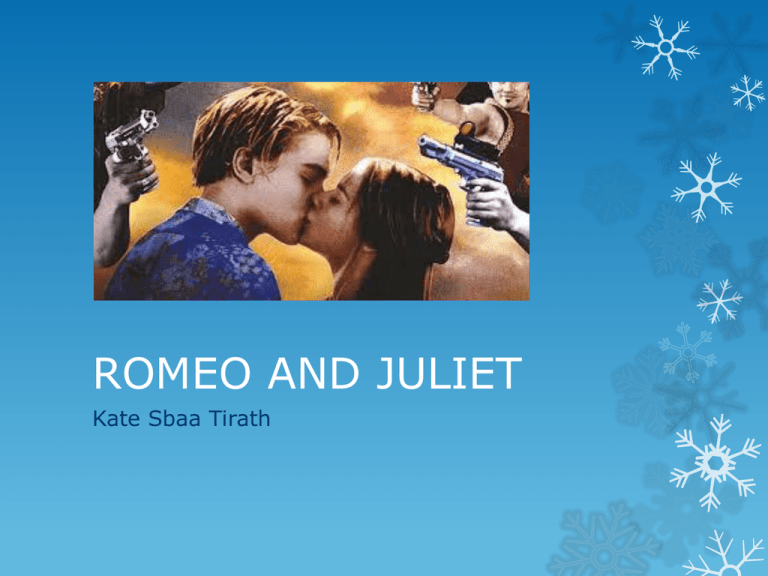
ROMEO AND JULIET
Kate Sbaa Tirath
Introduction
William Shakespeare’s “Romeo and Juliet” is a tragic drama
featuring two star crossed lovers who take their lives in
desperation to be together eternally. The drama’s central
concern is romantic love, especially the intense passion that
transpires at first sight between Romeo and Juliet. Their
love is initially an ecstatic and overpowering force, later
developing into a violent and desperate relationship that
supersedes all other values, loyalties and emotions.
Sampson and Gregory
Throughout the play, Shakespeare portrays different
ideals of love, one of which is the smutty and bawdy
view of love displayed by Sampson and Gregory in
the opening of the tragedy:
“Therefore women being the weaker vessels are ever
thrust to the wall: therefore I will push Montague’s
men from the wall, and thrust his maids to the wall.”
Sampson and Gregory’s conversation is full of crude
sexual references. Their language has violent
connotations with rude undercurrents. Although they
have not had sexual experiences with women, they
appear misogynistic and enjoy fantasizing about them
in the crudest terms. This contrasts with the pure,
powerful love that Romeo and Juliet feel for each
other.
Romeo’s Love for Rosaline
In contrast, Romeo’s view of love is far more
elaborate and dramatic. An impulsive and
immature character at the beginning of the play,
he wallows in self-pity highlighting his overly
romanticised view:
“O brawling love, O loving hate, O anything of
nothing first create”
This shows Romeo’s fickle and narcissistic attitude
towards love. He uses oxymoron's which suggests
that Romeo’s love is artificial whilst highlighting his
confused, emotional state. His over-emphatic
language further emphasises that Romeo’s feelings
of love are artificial.
Romeos Love for Rosaline 2
Romeo’s true intentions aren’t as pure and honest as
they initially seemed as it is revealed that he is merely
in lust:
“She will not stay the seige of loving terms, nor bide
th’encounter of assailing eyes, nor ope her lap to saintseducing gold.”
Although Romeo later develops a more mature and
spiritual view of love, here he only craves the physical
benefits that come with love. Romeo exaggerates his
feelings of despair and anguish over Rosaline's rejection
towards him. He seems to have no real experience with
love as he uses over the top vocabulary that he has
been taught from books and poems that he uses as
guides to identify his emotions.
The Nurse
The nurse is a vulgar, long-winded, and
sentimental character. Unlike previously, the
Nurse’s view of love does not fit into categories:
her view is neither over romanticised like Romeo’s
nor is it full of bawdy, sexual innuendos like
Sampson and Gregory’s view. Her depiction of love
is somewhere in between:
“Thou wilt fall backward when thou comest to age”
She provides a contrast with Juliet, given that her
view of love is earthy and sexual, whereas Juliet’s
is idealistic and intense. The Nurse believes in love
and wants Juliet to have a good-looking husband
but her vocabulary throughout this act is extremely
coarse and crude.
The Nurse 2
However, the Nurse’s priority is ultimately Juliet’s
happiness:
“Go, girl, seek happy nights to happy days”
Although she does not understand Juliet’s ideals
on love, she compromises her views and
encourages Juliet to make her own decision
without enforcing her bawdy and lustful opinions.
Mercutio's View
Mercutio believes that love is purely a physical act
as he describes to the audience his portrayal of
Rosaline:
“By her fine foot, straight leg, and quivering thigh,
and the demesnes that there adjacent lie”
Mercutio’s view is similar to Sampson and
Gregory’s. It is very lascivious and vulgar. He does
not see love as an act of affection and devotion, he
sees it in a much more cynical light.
Lady Capulet
Lady Capulet’s view of love is more pragmatic than
romantic. This is clear when she advises Juliet to marry
Paris because of the financial benefits:
“So shall you share all that he doth possess, By having
him making yourself no less.”
Unlike the nurse, Lady Capulet appears distant and cold
towards Juliet and when she breeches the topic of
marriage, she does not consider Juliet’s happiness. In
fact, the only reason that she wants Juliet to marry Paris
is because it will raise the families status and wealth.
This shows Lady Capulet’s warped view of love: she sees
love as a business agreement and not an act of
adoration.
Romeo and Juliet’s Love
The love shared between Romeo and Juliet is by far the
most strongest and powerful version of love in the entire
play. This is shown through the celestial imagery used
during the entirety of the sonnet:
“For saints have hands that pilgrims’ hands do touch, and
palm to palm is holy palmers’ kiss.”
The meeting of Romeo and Juliet dominates the scene, and,
with extraordinary language the excitement and wonder
that both protagonists feel is captured. Romeo’s language
here now takes on a richness and beauty which was missing
from his earlier, strained and insincere words about his love
for Rosaline, convincing the audience of his real and
profound love for Juliet. The spiritual nature of their love is
conveyed through the extended Christian metaphor which
suggests that Romeo worships Juliet with religious devotion.
Conclusion
William Shakespeare’s tragic play “Romeo
and Juliet” effectively portrays the many
representations of love through his use of
dramatic irony. Although the play does not
make a specific moral statement about the
relationships between love and society, it
reinforces the chaos and passion of being
in love, combined with the themes of
violence, death, religion, and family in an
impressionistic rush leading to the
drama’s tragic ending.




